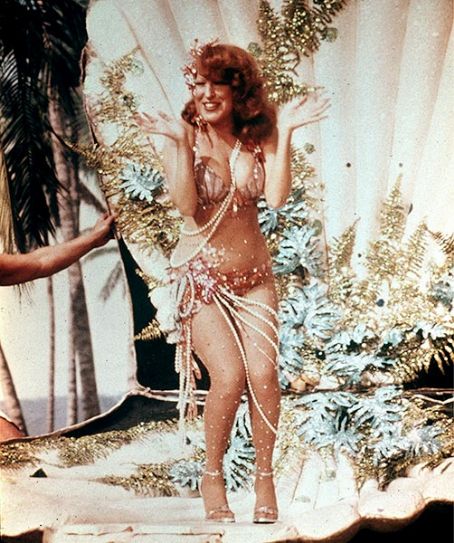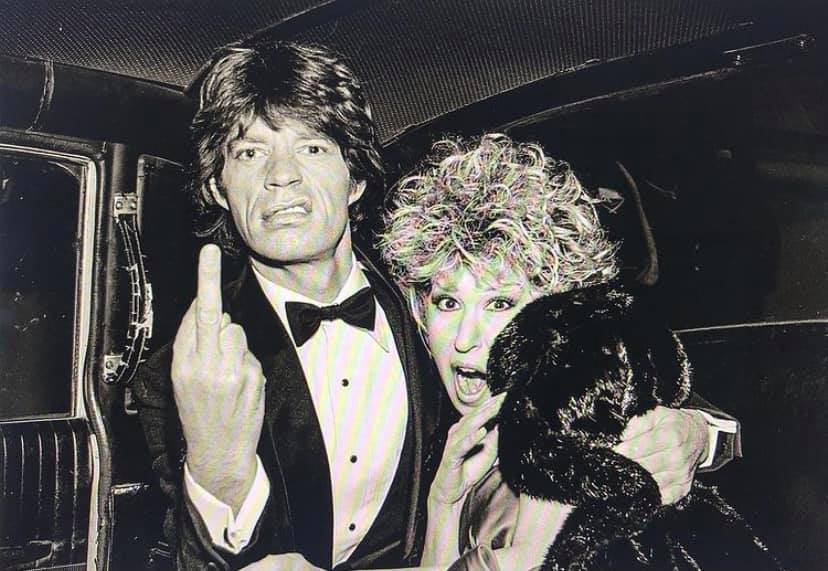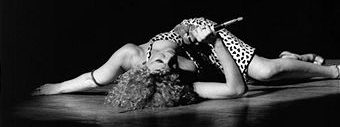PopMatters
BETTE MIDLER’S 1995 LP ‘BETTE OF ROSES’ IS A WARM EMBRACE
By Peter Piatkowski
28 July 2022

Mainstream pop albums like Bette Midler’s Bette of Roses work because the songs include a broader range of audiences and the themes relate to most people.
As part of her publicity blitz for her 1995 album, Bette of Roses (On ‘Bette Of Roses’Midler Seems At War With Her Commercial Instincts Vs. Her Artistic Instincts) Bette Midler visited London and appeared on comedienne Ruby Wax’s comedy chat show, Ruby Wax Meets…. The union of Midler and Wax seemed like a meeting of like-minded souls: like Midler, Wax made a career out of crafting a comedic persona that was brassy, sassy, and outspoken. Wax – an Illinois native – made the UK her home and became a cult figure in the 1990s. Part of her appeal was her interviewing style – it was a rapid-fire, almost stream-of-conscious, free association in which the comedienne would lob questions and throw snarky asides. If anyone could keep up with the lightning-fast Wax, it would be Midler.
The bulk of the interview saw Midler and Wax descend upon Harvey Nichols, the venerable London department store. Whilst messing about with the merchandise and making the gobsmacked customers laugh, Midler and Wax chatted, with Midler talking about her life in Hawaii, remembering working at a pineapple cannery. She even demonstrated her pineapple slicing skills in front of a nonplussed employee who provided the funny ladies with a tiny pineapple as a comedy prop. Wax’s agenda was to engage with Midler’s comedic persona, and Midler, being a good sport, played along, but from time to time, she did return to the matter at hand: Bette of Roses.
Ruby Wax Found “To Deseve You As Self Deprecating And Self Effacing
When Bette of Roses was first mentioned in the interview, Wax sniffed dismissively at the first single, “To Deserve You”, which she saw as self-deprecating and self-effacing. Midler, ever-so-slightly defensive, disagreed, finding spirituality in the record. Wax wasn’t impressed. Later in the department store, whilst riding the escalator, Midler sings “To Deserve You” a cappella – just a few bars – reminding Wax that the label brought her out to sell the album. “I gotta get [Bette of Roses] in, Ruby,” Midler says, bringing some of the tomfooleries to a pause so she can do a shameless plug for the album.1
But Wax’s interest in Midler doesn’t lie in her music. At least not her new music. She’s far more interested in spotlighting Bette Midler, the Comedienne. When Midler’s music does come up, inevitably, it’s “The Wind Beneath My Wings”, the number one pop hit from her 1988 melodramatic musical dramedy, Beaches (directed by Garry Marshall). Whilst Midler gamely brings up the album, trying to interrupt the comic exchange she’s displaying with her host, Bette of Roses seems a bit doomed.
Wax’s lack of interest in Bette of Roses indicates a larger response to the album, which was released in the summer of 1995. It reached number 45 on the Billboard 200 and 55 on the UK album charts. It sold reasonably well – it eventually went platinum in the States, and it earned a silver disc in the UK (a market she can usually count on).
So, though it would be a stretch to call Bette of Roses a disappointment, it did not make the same impact as her biggest hits: the soundtrack to Beaches and the studio LP follow-up, 1990’s Some People’s Lives, which was essentially formatted to be a Beaches sequel, even if the film itself didn’t have a sequel. Midler’s music career has always been somewhat sporadic compared to her touring or film work. When she started out in the 1970s, she was far more prolific. Between 1972 when her debut album The Divine Miss M was released, she put out five studio albums, one soundtrack, one live album, and a greatest hits compilation. In 1979, Midler made her film debut in the searing musical drama The Rose and was rewarded with an Oscar nomination. Thus began Midler’s movie career, which blew up in the 1980s after she signed a development deal for Disney.

Though the music was never far away from Midler’s work, it seemed to augment her movie career. In the 1980s, she made precious little music, aside from one studio album and a comedy record, before making a concerted pop effort with the soundtrack to Beaches. Conveniently, the plot has Midler depict a pop singer modeled mainly after herself. When “Wind Beneath My Wings” came out in 1988, it became a smash hit and has since become a standard at weddings, funerals, graduations, and other life events. The song’s sound and production were eons away from the raucous torch singing entertainer of the 1970s, who entertained a roomful of naked men at the Continental Baths, belting out bluesy renditions of “Delta Dawn”, “Leader of the Pack”, or “Friends”.
That singer was an explosive combination of Sophie Tucker, Judy Garland, Janis Joplin, and Merry Clayton. The singer of “Wind Beneath My Wings” was far more tasteful and mannered – she sounded far more like Barbra Streisand than Joplin. The song’s success completely reinvented Midler’s musical persona, and she became known as a sentimental pop balladeer, as evidenced by the massive success of her 1990 single, “From a Distance”, which is a “Wind Beneath My Wings” soundalike. So ‘set’ was Midler’s rep as a wedding dance troubadour that when the MOR pop standard “Save the Best for Last” was being shopped around, it first went to Streisand and Midler, both of whom turned it down, only to see former beauty queen-turned-pop diva Vanessa Williams have a gigantic hit with the love ballad.
After the success of Beaches, Midler’s pop career could be divided into two distinct eras: Before Beaches and After Beaches.
After the success of Beaches, Midler’s pop career could be divided into two distinct eras: Before Beaches and After Beaches. Everything after seemed like a response or an answer to Beaches and “Wind Beneath My Wings” in particular. So, when Bette of Roses was released, Midler had been working for seven years in the wake of the success of “Wind Beneath My Wings,” and her music career never managed to escape the overpowering affection and endurance of that tune. Whilst she was still working on films and concerts (as well as putting out soundtracks to her movies), after Some People’s Lives, she returned to the studio in 1991 to record the soundtrack to her labor of love, the World War II musical drama, For the Boys and in 1993 she released the soundtrack to her TV movie debut, Gypsy. But Bette of Roses represented the first time in five years that she made a concerted effort to return to the pop charts with a project that wasn’t attached to a film, concert, or TV project.
Bette of Roses is a fascinating piece of evidence in the ongoing contradiction that is Bette Midler.
Just as Some People’s Lives sounded much like Beaches, Bette of Roses would follow a similar template to those two successful albums. Namely, Midler would again release a record of dewy, pillowy love ballads. Bette of Roses is a fascinating piece of evidence in the ongoing contradiction that is Bette Midler. Though known as a bawdy, funny lady, she also has a deeply sentimental side to her persona, which she leaned on largely in the 1990s. Her genesis came from the gay bathhouses, yet by 1995, she was the epitome of respectability. Her music was the stuff that would be piped through the sound systems at department stores. Daughters would dance with their fathers at weddings to her voice. The subversive quality of that loud-mouthed diva was compartmentalized. It wasn’t completely gone: her live shows still maintained some of that saltiness – particularly when she performed her Sophie Tucker material – but for the most part, she became tasteful and pristine.
When Midler combed through the songs that would eventually make up the tracklist for the album, she considered calling the record Mom
Bette of Roses is tasteful and pristine. It’s a clean, shiny record with a studio gloss that was so prevalent in 1990s pop albums. Unlike Beaches or Some People’s Lives, Bette of Roses would contain no novelty numbers or cutesy tunes that highlighted Midler’s humor (the funniest thing on the album is the punny title). When Midler combed through the songs that would eventually make up the tracklist for the album, she considered calling the record Mom because she envisioned the developing project as a very nurturing work. “I toyed with the idea of calling [Bette of Roses] ‘Mother’ or ‘Mom.’” Midler said. “The songs are nonjudgmental….They’re very upbeat, with sweet, positive messages….In other words, Mom.”2
Bette of Roses works like a pop version of a Hallmark card. The songs on the album are flowy, lovely, and flowery. The sound is awash with breezy synths, easy-going drumming, and elegant keyboards. Bette of Roses doesn’t scream respectability – instead, it coos it lovingly.
What Saves “To Deserve You” Is The Arrangement & Midler’s Vocal Performance
The first single, “To Deserve You,” had Ruby Wax respond with snark because the lyrics posit Midler as practically prostrating in front of whomever she’s singing. Comparing herself to other “golden” women, Midler admits to having “needs too demanding / Too proud”, and then she ruefully adds, “How I want / How I want to deserve you.” Elsewhere in the song, she cowers, singing, “I didn’t want you to see me like this / I’m weak / And I fight like a fool.” Wax’s issue with the song is understandable because the song could be accused of being graveling. What saves the record from collapsing underneath the weight of Midler’s devotion is the arrangement and Midler’s vocal performance.
When Madonna won the role of Evita in 1996, she went to singing teacher Joan Lader, who worked to expand and strengthen her vocals. After Evita, Madonna sported a far more muscular and defined voice which was evident in her 1998 album Ray of Light. In 1993, Midler was cast as Mama Rose Lee in the HBO production of the Jule Styne/Stephen Sondheim show, Gypsy. In preparation for the role, Midler took vocal lessons with Marge Rivingston. Already a strong and powerful singer, Midler’s training with Rivingston made her voice bigger, expanding her range. “I found a singing teacher, Marge Rivingston, who took my voice out of my throat and put it in my head.” She added, “She helped me get a new set of vocal abilities.”3

And so we hear the fruits of that labor on “To Deserve You”, which displays many sides of Midler’s expressive voice. When she sings the verses, she does so in a low register, being able to suffuse the lyrics with a rueful regret. When she first sings “How I want to deserve you,” she precedes the lyric with a quick “ugh,” injecting the line with sharp self-defeat. But as the song continues, it expands as does Midler’s voice, so that even though she’s singing words that are completely self-defeating like “I didn’t want you to see me like this,” she belts them in a soaring call. Writer Mark Bego opined that Midler’s singing on the track is “the best song she has ever recorded in her career.” He praised her ability to relate to the lyrics, pointing out that Midler’s “emotionally connecting with her lyrics and really singing” makes the song an “undeniable Midler masterpiece.”4 Ric Leyva complimented the song’s vocal arrangement, highlighting Midler’s ability to “flawlessly [traverse] its demanding two-octave landscape.”5
The tension that Midler wrings out of the lyrics are juxtaposed with the unspoiled, cleanliness of the production. Despite Midler’s success with MOR balladry, she’s always going to be a deeply expressive vocalist. So, even if her phrasing and vocalizing are polished, she still possesses a distinct voice with a character that disrupts the homogeneous production. The Bathhouse Betty of the Continental Baths is no longer around on “To Deserve You,” but the distinct and unique artist who birthed her struggles against the studio gloss, and there’s a tug-of-war happening: Midler’s commercial instincts are warring with her artistic instincts. And the resultant angst highlights a disconnect between Midler and her material.
Writer Mark Bego opined that Midler’s singing on the track is “the best song she has ever recorded in her career, an undeniable Midler Masterpiece”
And because “To Deserve You” and the rest of Bette of Roses feels so clean, it feels as if Midler is looking to distance herself from her queer history – at least on vinyl. But that distancing never keeps. “To Deserve You” was released as a single, and even though radio largely set it aside, it became a sizable hit in the dance clubs once remixed. It rose to number two on the Billboard dance charts (her first hit on that chart in almost two decades). The hit remix, credited to longtime Milder collaborator Arif Marden, takes the A/C origins of the tune and recasts it as a house-pop number. Midler’s vocals are sampled, her breathy “I would die for you” and her assertive worldless vocalizing punctuating the chunky dance beats and gaudy synthesizer. The ‘Dance Remix’ retains much of the pop melody and structure of the original; this isn’t dub or deep house reworking of the song. Though the maxi-single contains some more esoteric remixes, and therefore Midler’s singing is largely maintained, it’s festooned with studio trickery (including the vocal samples). The song’s desperation – the one that Wax seemed to have despised – has been subsumed by the flashy dance production.

The video of “To Deserve You” is another fascinating artifact of Midler’s mid-1990s career. Because Bette Midler came of musical age in the 1970s and was largely absent from music in the 1980s, she has a somewhat diffident history with the art form. Her first music video for MTV was for her cover of the Rolling Stones’ “Beast of Burden” (which featured a cameo by Mick Jagger). Midler was like a number of artists who preceded the MTV generation. Her being such a prolific and established actress who didn’t record much in the 1980s meant that she wasn’t a major figure of the MTV generation (even though she hosted the inaugural MTV Music Video Awards in 1984 with fellow comedians Dan Aykroyd). After “Beast of Burden,” she wasn’t featured in a solo music video until 1988’s Beaches, when “Wind Beneath My Wings” went into the heavy rotation due to the song’s huge success.
For “To Deserve You,” director Marcus Nispel decided to remain oblique and symbolic with the video. Instead of narrative or story, we see Midler in a beautiful white gown posing and vamping on a set. It’s a very pretty video, and Midler looks gorgeous and relaxed. There are shots of paper lanterns and disembodied hands playing Rochambeau, and the concept works well with the song. The video opens with a shot of Midler, brightly lit; at times, she’s shielding her eyes from the spotlight as if she was under the sun. As she sings, “I see so many golden women,” two hands open to show a pair of wedding rings before the camera turns back to Midler, swathed in lovely white. Nispel intersperses images of Midler with elegant arrangements of flowers and paper lanterns as if we’ve wandered into a home decor boutique. The video – like her videos for “Wind Beneath My Wings” and “From a Distance,” present Midler as a pop diva without reference to her comedy. As the camera pulls back, we see the set in the context of a studio, so Nispel purposely creates a dissonance in which we see the inherent artificiality of music videos. Because there isn’t a narrative or story to the video, Nispel successfully recreates a glamour photo shoot with Midler as his supermodel and freed from her wacky, comedic persona, Midler is allowed to be glamourous without hamming it up.
Though “To Deserve You” didn’t return Midler to the top of the charts, it was a fitting way to introduce the album to Midler’s buying public. It is also a great indicator of the sound of Bette of Roses. When she describes the album as maternal, she wasn’t on autopilot, blathering empty platitudes to sell her album. So much of Midler’s work after Beaches dealt with sentimental ideals of motherhood, especially her music and film work in the early 1990s: she adopted a softness and a calm that felt divorced from the rowdy chanteuse who used to entertain gay guys in the bathhouses. Movies like Beaches, Stella, and For the Boys featured roles for Midler, in which she played mothers. A sentimental, pretty album like Bette of Roses fits alongside those projects nicely.
Midler indulges in some sentimental nostalgia to open the album with “I Know This Town”. Nostalgia has been a constant theme in her work.
Midler indulges in some sentimental nostalgia to open the album with “I Know This Town”. Nostalgia has been a constant theme in her work. One of her biggest hits from The Divine Miss M is a remake of the Andrew Sisters’ “Boogie Woogie Boy”. As an artist, she has always been fond of the past. Her live shows and albums often featured covers of old chestnuts and pop standards, and her Sophie Tucker persona was an homage to the trailblazing comedienne of the past. In 1991, she poured her talents into For the Boys, a Martha Raye-inspired musical drama that was a labor of love.

But with “I Know This Town,” the nostalgia is of a different sort. The lyrics tell the story of Americana – but the kind painted by Norman Rockwell. Midler didn’t grow up in the kind of Small Town America that she’s singing about on the tune – she didn’t ride her bike along tree-lined streets, nor did she hang out at the town to buy smokes, Dentyne, or Cokes from an old-fashioned machine. The lyrics – penned by folk singer-songwriter Cheryl Wheeler – evoke a sun-dappled yesterday, and Midler creates a fictional childhood through her interpretation of the song. Midler’s childhood was far less prosaic; growing up in Honolulu, the only Jewish girl in her poor neighborhood among the sugarcane fields. But the nostalgia of “I Know This Town” is meant to call up feelings of comfort and warmth and make the story in the lyrics universal, so it’s a fictional background that Midler appropriates for the tune that is far more relatable than her childhood in Hawaii.

Bette of Roses is bookended with nostalgia, opening with “I Know This Town” and ending with “I Believe in You.” A bright sunny pop ballad was written by Sam Hogin and Roger Cook, “I Believe in You” is a song that’s essentially a litany of couplets in which Midler sings the lyrical memories of the Baby Boomer generation as she professes her love and her enduring optimism about love. When she croons, “that the Beatles could be history / The ’60s just a memory / That war will never go away / That Johnny Carson’s had his day,” she’s appealing for a space in which her memories are not only validated but that her experiences aren’t relegated to ancient history. So much of rose-tinted Baby Boomer nostalgia relies on telling stories and experiences of the 1960s. The allusion to Johnny Carson is also personal for Midler because she famously serenaded the legendary talk show host during his final, much-ballyhooed show, bringing him to tears with a lovely rendition of the pop standard, “One for My Baby (And One More for the Road).” Though Midler has a personal link to Carson, the sentiment expressed in the song is one that many of her generations had when Carson left television, and the song also uses other various touch points of Baby Boomer history – and that’s key to the song’s success.
The Album Works Because Midler Is An Expressive & Resourceful Singer Applying Her Acting Gifts To Her Performance
Actually, both of the songs on Bette of Roses that deal in nostalgia succeed because of their relative anonymity. None of the songs on the album is particularly personal or detailed – anyone Midler’s age could have experienced some of what she was singing, or at least related to it. That’s why mainstream pop albums like Bette of Roses work – the songs tend to be inclusive of a broader range of audiences because the themes they contain: namely love, heartbreak, and longing are feelings that most people can relate to; and because Midler isn’t a songwriter, the tunes on the album aren’t the personal, candid stories that we would hear on a Joni Mitchell album. If a song sounds personal and honest, it’s because Midler’s an expressive and resourceful singer with a knack for applying her acting gifts to her singing.

WORKS CITED
1 “Bette Midler and Liza Minnelli.” Ruby Wax Meets….Hosted by Ruby Wax, series 1, episode 4, BBC, 1996.
2 Holden Stephen. “The Two Sides of Bette Midler, Mushy and Divine.” The New York Times. 16 July 1995.
3 Holden, Stephen. “The Two Sides of Bette Midler, Mushy and Divine.” The New York Times. 16 July 1995.
4 Bego, Mark. Bette Midler: Still Divine. Cooper Square Press: New York City, 2002.
5 Leyva, Ric. “Better Bette Singing Wasn’t Always Fun for Bette Midler, but These Days She’s Having a Blast.” The Spokesman-Review. 27 August 1995.







This was fascinating! I would love an article like this for every Bette album. ??
I was going to say something about that. When I was growing up it seems like reviews went more in depth. Nowadays you’re lucky if you can find a paragraph on one. So this was very interesting to me. The author brought up a couple of things I’ve been thinking of for years but I just didn’t know how to express it in the right way/
Bette of Roses is one of my favorites. Honest to God, I was listening the other day. LOL.
I love it and I love how she sounds in it, I love the video… I love everything about itm. And it actually feels honest to me. She was at a different time in her life and her voice addresses that beautifully.
There’s on youtube and interview from ET where she actually said she sang it to Martin. Ruby would really not enjoy that LOL
Found it…
https://youtu.be/HHllBXK4H1c
Cool…I just posted the Ruby Wax interview